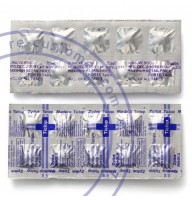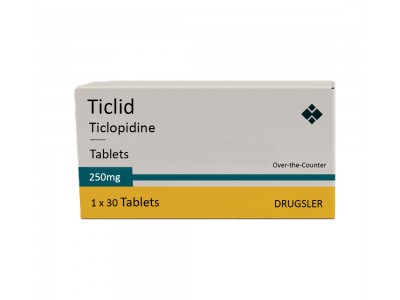Ticlid (ticlopidine) can interact with several medications, potentially affecting its effectiveness or increasing the risk of side effects. Some of the key interactions to be aware of include:
Anticoagulants: Concurrent use of ticlopidine with other anticoagulant medications, such as warfarin or heparin, may increase the risk of bleeding. Close monitoring of clotting parameters (like INR for warfarin) is essential if these medications are used together.
Nonsteroidal Anti-Inflammatory Drugs (NSAIDs): NSAIDs like ibuprofen or naproxen can increase the risk of gastrointestinal bleeding when combined with ticlopidine. Caution is advised, and these medications should be used together only if absolutely necessary and under medical supervision.
Proton Pump Inhibitors (PPIs): PPIs such as omeprazole or pantoprazole, which are used to reduce stomach acid, may reduce the effectiveness of ticlopidine. Separating the doses by at least two hours may help minimize this interaction.
CYP2C19 Inhibitors: Ticlopidine is metabolized by the enzyme CYP2C19. Drugs that inhibit this enzyme, such as fluconazole or fluoxetine, can potentially increase ticlopidine levels in the blood, leading to an increased risk of side effects. Close monitoring and dose adjustments may be necessary if these medications are used together.
Other Antiplatelet Agents: Concurrent use of ticlopidine with other antiplatelet medications, such as aspirin or clopidogrel, should be carefully considered due to an increased risk of bleeding. Combination therapy may be used in specific clinical scenarios but requires careful monitoring.
Phenytoin: Ticlopidine may increase the blood levels of phenytoin, an anticonvulsant medication. Monitoring of phenytoin levels and potential adjustment of dosage may be needed if used concurrently with ticlopidine.
Statins: Some statin medications, such as atorvastatin or simvastatin, may interact with ticlopidine, potentially increasing the risk of statin-related side effects like muscle toxicity. Monitoring for statin-related adverse effects is recommended if these medications are used together.
These are not exhaustive lists of interactions, and other medications or supplements may also interact with ticlopidine. It's crucial for patients to inform their healthcare provider about all medications, including prescription, over-the-counter, and herbal products, to minimize the risk of interactions and ensure safe and effective treatment with ticlopidine.

